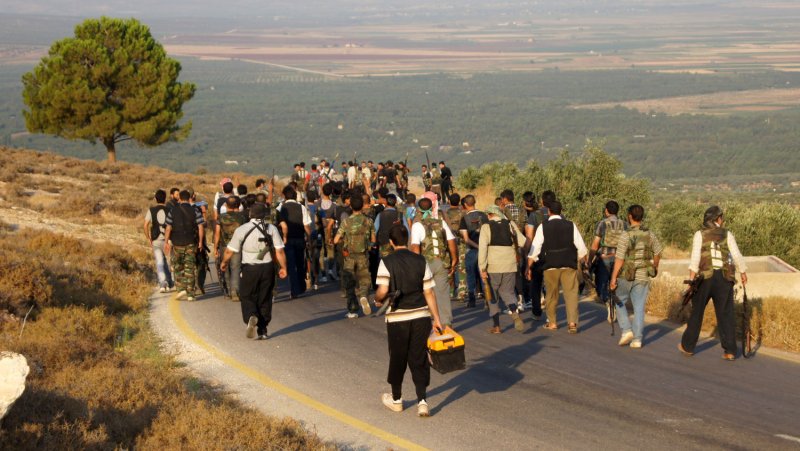Members of the Free Syrian Army hold onto their weapons as they walk on a road at Haram, near Idlib in Syria, September 1, 2012. FILE/UPI |
License Photo
DAMASCUS, Syria, April 30 (UPI) -- An explosion ripped through Marjeh Square in the center of Damascus Tuesday, killing 13 people and wounding more than 70, Syria's state-run television reported.
Elsewhere, two people were killed and 20 others were injured Tuesday when planes dropped bags of suspected chemicals in Idlib province, al-Jazeera reported.
Videos from the Qatari news network appear to show victims having difficulty breathing, and in one, a patient at a makeshift hospital has white foam coming from his mouth.
In the Damascus bombing, the opposition group the Syrian Observatory for Human Rights said at least five security force members were killed when a bomb-laden car exploded near the back door of a building that once housed the Interior Ministry, The New York Times reported.
Syria's state television said the dead were all civilians.
On Monday, an explosion targeted the convoy of Syrian Prime Minister Wael al-Halki, in an affluent area of Damascus. State news media said Halki survived the attack in which five people, including a bodyguard, were killed.
The latest suspected chemical weapons attack allegedly perpetrated by President Bashar Assad's regime comes after the United States and Israel have expressed concern and threatened possible action as a result of the use of such weapons in the Syrian civil war, Ynetnews.com reported.
Forty-two people suffocated to death last week after an alleged chemical attack on a Damascus suburb, rebels said.
Meanwhile, the British charity Oxfam said in a report Tuesday the 6.8 million internally displaced Syrians need immediate assistance, stressing funds currently available are insufficient to address the crisis.
The United Nations has received half of the money that had been pledged, the Oxfam report said.















